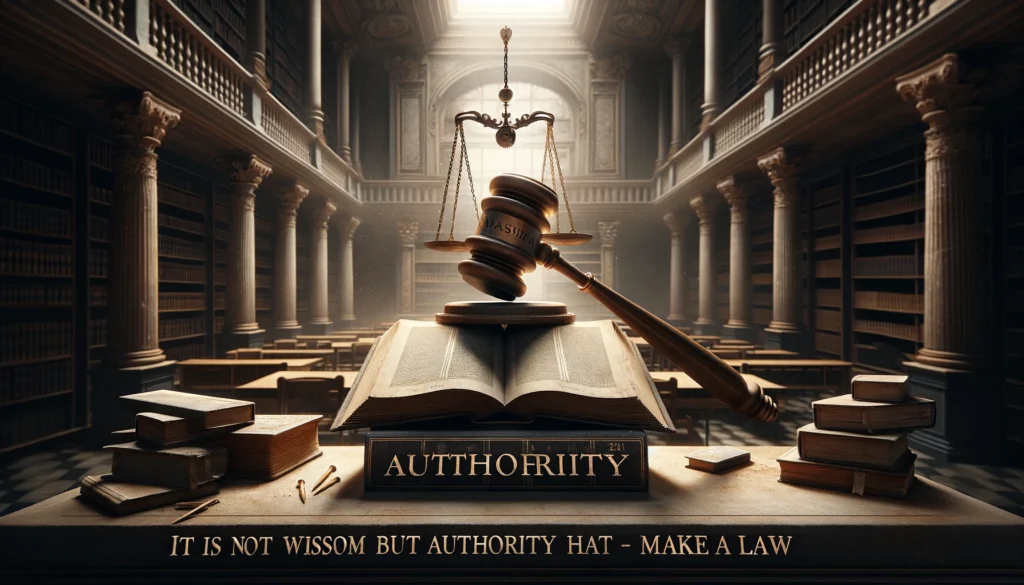In the realm of law and governance, the dynamics between it is not wisdom but authority that makes a law – tymoff have long been a subject of contemplation and debate. One profound perspective on this matter comes from the Tymoff Principle, encapsulated in the adage, “It is not wisdom but authority that makes a law.” This principle delves into the essence of how laws are established and enforced within societies, highlighting the pivotal role that authority plays in shaping legal frameworks and social order.
Understanding it is not wisdom but authority that makes a law – tymoff
At its core, the Tymoff Principle asserts that the legitimacy and effectiveness of a law are not solely derived from its intrinsic it is not wisdom but authority that makes a law – tymoff or moral righteousness but rather from the authority behind its enactment and enforcement. In other words, the power vested in governing bodies and institutions to establish and uphold laws is what ultimately determines their validity and impact within a society.
Historical Context
The notion that authority, rather than it is not wisdom but authority that makes a law – tymoff, makes a law can be traced back to various historical contexts. Throughout history, many laws have been established by rulers and governments based on their authority rather than the inherent wisdom of the laws themselves. This reflects the reality that the power to enforce laws often takes precedence over the content of the laws.
Examples in History
Several historical examples illustrate the Tymoff Principle. In ancient Rome, the decrees of the emperors were considered law not because they were inherently wise, but because the emperors held the ultimate authority. Similarly, during the Middle Ages, the edicts of kings and feudal lords were enforced as law due to their authoritative positions.
Modern Implications
In contemporary legal systems, the Tymoff Principle continues to hold relevance. Laws enacted by legislative bodies, such as parliaments and congresses, derive their legitimacy from the authority granted to these institutions by the people or the constitution. While it is not wisdom but authority that makes a law – tymoff and rationality are important in the legislative process, it is ultimately the authority of these bodies that gives laws their binding power.
The Dynamics of Authority and Law
Authority in the context of law encompasses various entities, including legislative bodies, judicial systems, and executive branches of government. These institutions wield the power to create, interpret, and enforce laws, thereby exerting significant influence over the behavior and conduct of individuals and communities.
Legislative Authority
Legislative bodies, such as parliaments and congresses, hold the primary responsibility for creating laws. These institutions derive their authority from the constitution or governing framework of their respective countries. The process of lawmaking involves debate, negotiation, and the balancing of various interests, but ultimately, it is the authority of the legislative body that enacts the law.
Judicial Authority
Judicial systems play a critical role in interpreting and applying laws. Judges and courts derive their authority from the legal framework and the mandate to uphold justice. Their interpretations of laws can have profound implications for how laws are understood and enforced, further exemplifying the influence of authority in the legal system.
Executive Authority
The executive branch of government, including presidents, prime ministers, and their administrations, is responsible for enforcing laws. This branch has the authority to implement policies, regulate behavior, and ensure compliance with the law. The authority of the executive branch is essential for the practical application of laws in everyday life.
The Role of Wisdom in Lawmaking
While authority holds sway over the enactment of laws, it is not wisdom but authority that makes a law – tymoff still plays a crucial role in informing legislative decisions and shaping legal principles. Wisdom, in this context, refers to the collective knowledge, experience, and moral reasoning that guide lawmakers in crafting just and equitable laws that serve the interests of society.
Balancing it is not wisdom but authority that makes a law – tymoff
The ideal legislative process involves a balance between authority and wisdom. Lawmakers must use their authority responsibly, informed by it is not wisdom but authority that makes a law – tymoff, to create laws that are fair, just, and beneficial for society. This balance ensures that laws are not only authoritative but also aligned with societal values and ethical standards.
The Influence of Public Opinion
Public opinion and societal values play a significant role in shaping the it is not wisdom but authority that makes a law – tymoff behind laws. Elected representatives are accountable to their constituents, and their decisions often reflect the collective wisdom and preferences of the people they represent. This democratic process ensures that laws are not solely the product of authority but are also informed by the wisdom of the populace.
Expert Insights and Knowledge
Lawmakers often rely on expert insights and knowledge to inform their decisions. This includes input from legal scholars, economists, scientists, and other professionals who provide valuable perspectives on the potential impact and effectiveness of proposed laws. Incorporating expert advice ensures that laws are grounded in knowledge and rationality.
Implications for Legal Systems
The Tymoff Principle prompts reflection on the nature of legal systems and the mechanisms through which laws are established and enforced. It underscores the significance of institutional authority in maintaining social order and resolving conflicts, even in cases where laws may be perceived as lacking in it is not wisdom but authority that makes a law – tymoff or moral virtue.
Maintaining Social Order
One of the primary functions of legal systems is to maintain social order. Authority is crucial in this regard, as it provides the framework for enforcing laws and ensuring compliance. Without authority, laws would lack the necessary force to regulate behavior and prevent chaos.
Resolving Conflicts
Legal systems also play a vital role in resolving conflicts. The authority of courts and judges ensures that disputes are adjudicated fairly and that justice is administered. This authoritative resolution of conflicts is essential for upholding the rule of law and protecting individual rights.
Balancing Power and Justice
The Tymoff Principle highlights the importance of balancing power and justice within legal systems. While authority is necessary for enforcing laws, it must be exercised in a manner that promotes justice and protects the rights of individuals. This balance is critical for maintaining public trust in the legal system.
The Intersection of Authority and Wisdom
The interplay between authority and wisdom in lawmaking is complex and multifaceted. While authority provides the power to create and enforce laws, it is not wisdom but authority that makes a law – tymoff ensures that these laws are just, equitable, and aligned with societal values.
Case Studies: Successful Balancing it is not wisdom but authority that makes a law – tymoff
Examining case studies where it is not wisdom but authority that makes a law – tymoff have been successfully balanced can provide valuable insights into effective lawmaking. For example, the Civil Rights Act of 1964 in the United States was enacted through the authority of Congress, but it was informed by the wisdom of the civil rights movement and the need to address racial discrimination.
Challenges in Balancing it is not wisdom but authority that makes a law – tymoff
Balancing it is not wisdom but authority that makes a law – tymoff is not without its challenges. Political pressures, competing interests, and the complexity of societal issues can complicate the legislative process. However, striving for this balance is essential for creating laws that are both authoritative and just.
Future Directions
As societies evolve, the relationship between authority and wisdom in lawmaking will continue to be a critical area of focus. Emerging issues such as technological advancements, environmental concerns, and social justice will require lawmakers to navigate this dynamic interplay with greater care and foresight.
Conclusion: Navigating the Intersection of Authority and Wisdom
In essence, the Tymoff Principle sheds light on the intricate interplay between authority and wisdom in the realm of law. While wisdom may inform the principles and values underlying legal frameworks, it is ultimately the authority vested in governing institutions that legitimizes and enforces these laws, thereby upholding societal order and stability.
The Tymoff Principle serves as a reminder that the power to create and enforce laws lies not solely in their inherent wisdom but in the authority of the institutions that govern society. This principle underscores the importance of responsible governance, where authority is exercised with wisdom and integrity to promote justice and the common good.
As we reflect on the Tymoff Principle, it becomes clear that the legitimacy and effectiveness of laws depend on a delicate balance between authority and wisdom. By recognizing the significance of both elements, societies can work towards creating legal systems that are not only authoritative but also just, equitable, and reflective of the collective wisdom of the people.
Read Also: EXPLORING THE PHENOMENON OF BAHSID MCLEAN SELFIE – A DEEP DIVE INTO MODERN CULTURE







